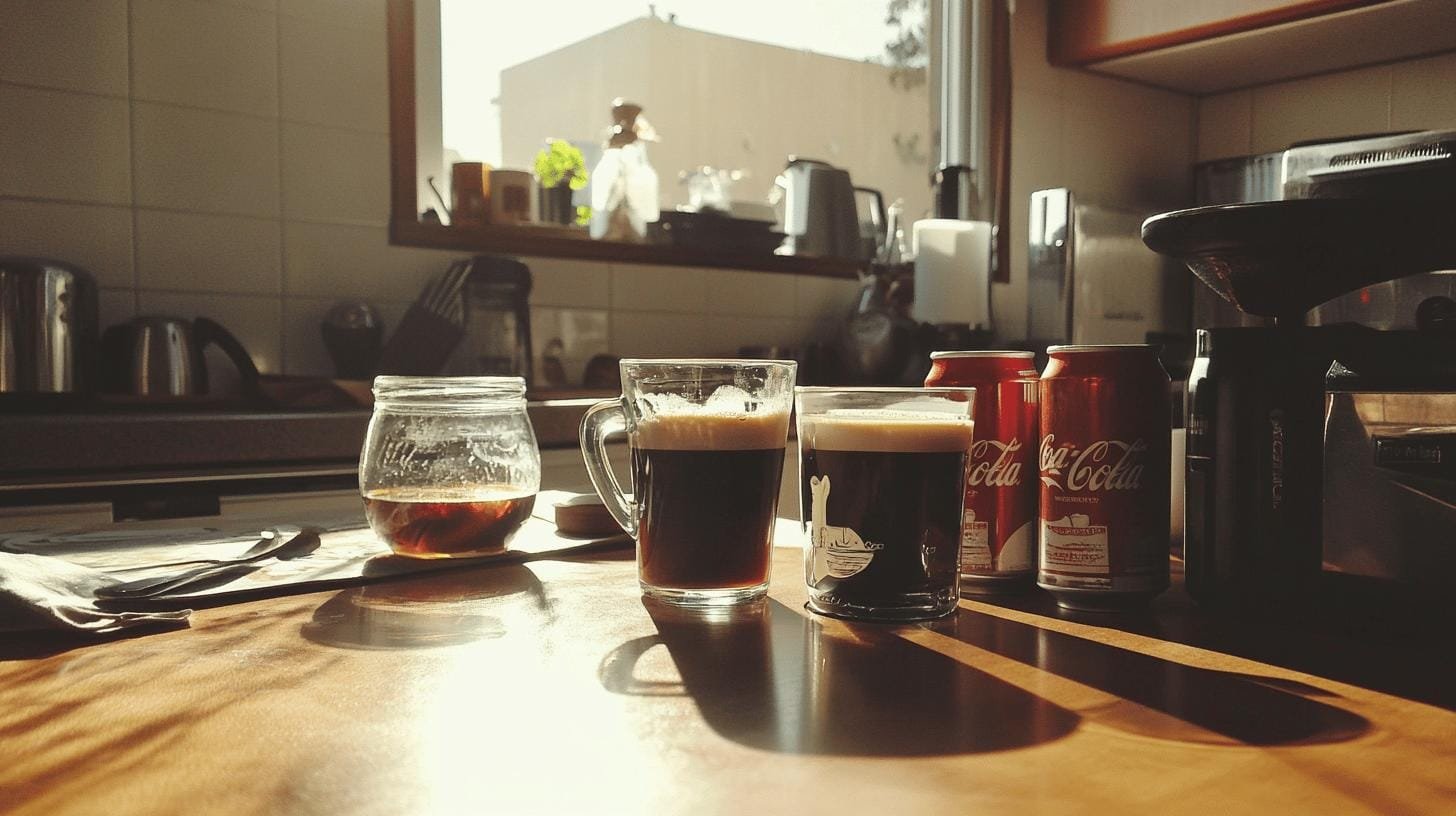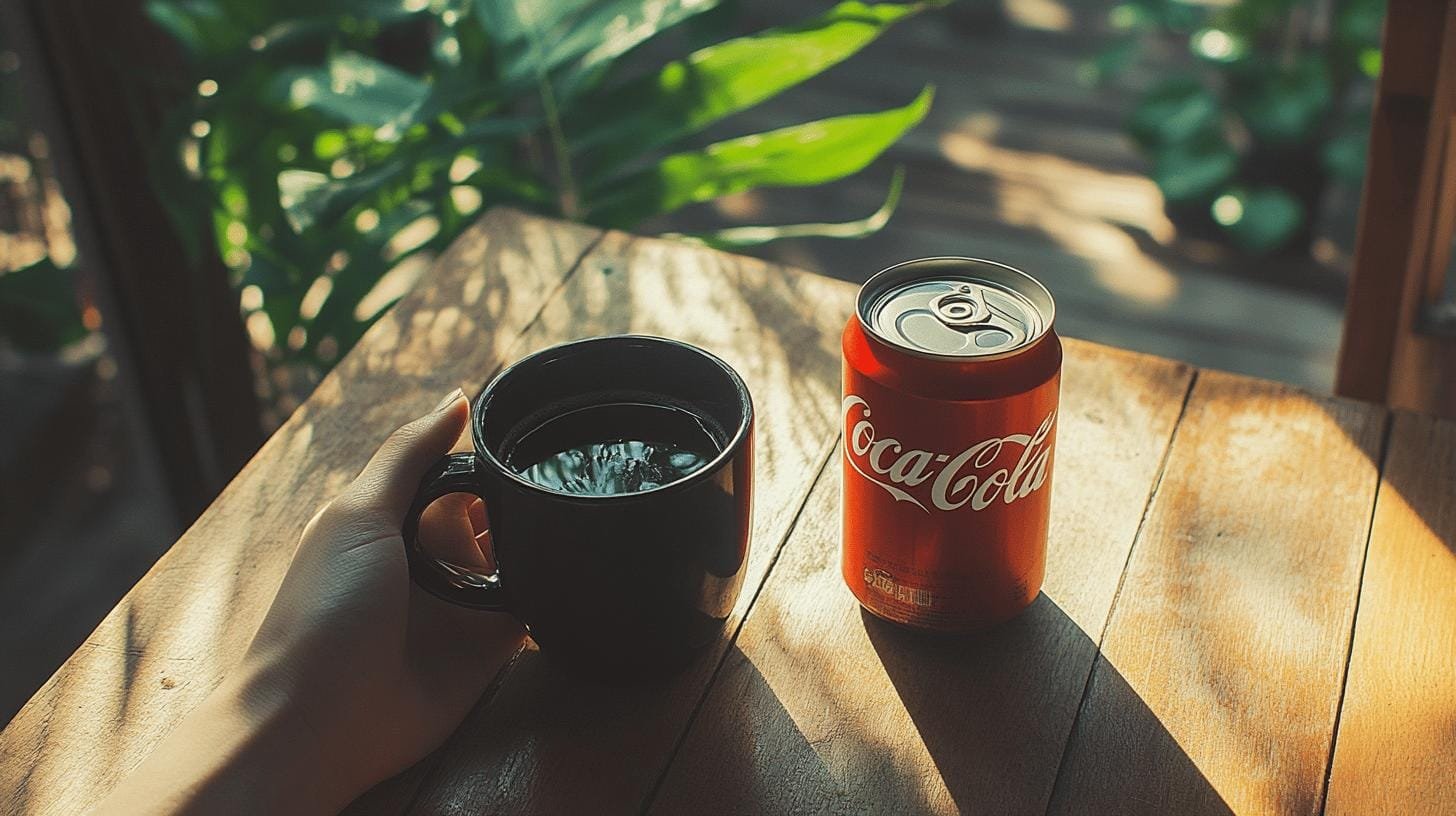
Community-Building Strategies for Independent Coffee Shops (That Actually Work)
Introduction Independent cafes win when they feel like the neighborhood’s living room and operate with the discipline of a great kitchen. Below is a quick

Did you know that your daily choice of caffeine hit might carry starkly different caffeine counts? An 8-ounce cup of coffee typically trumps a 12-ounce can of Coca-Cola, packing nearly three times the caffeine punch. What accounts for this variation, and how do factors like the type of coffee bean or brewing method tip the scales? As a coffee aficionado, understanding these key differences isn’t just an exercise in curiosity—it’s foundational to mastering your daily caffeine balance. Uncover a detailed comparison of the amount of caffeine in coffee vs Coke, and make more informed choices between your coffee brew and a can of Coke
An 8-ounce cup of coffee usually contains about 95 milligrams of caffeine. Meanwhile, a 12-ounce can of Coca-Cola has around 34 milligrams. This difference shows that coffee is a stronger caffeine source, with almost three times the caffeine per serving compared to Coke.
Several factors affect the caffeine content in coffee:
These elements make it hard to pinpoint exact caffeine levels in coffee. Different beans, like Arabica and Robusta, have varying natural caffeine amounts. Brewing methods, such as espresso or French press, also change the caffeine extraction.
In contrast, Coca-Cola maintains a consistent caffeine level in each can due to its precise manufacturing process. This means every can has the same caffeine content, offering predictability. While Coke has less caffeine, its uniform formulation makes it a preferred choice for a gentler caffeine boost.

A small espresso shot has about 70 milligrams of caffeine. Despite its size, espresso packs a significant caffeine punch due to the brewing process. Hot water forced through fine coffee grounds at high pressure results in this concentration.
Decaf coffee typically has between 2 to 5 milligrams of caffeine per cup. “Decaf” doesn’t mean zero caffeine; the process removes most, but small amounts remain. Coke variants, like Regular Coke, Coke Zero, and Diet Coke, have approximately 34 milligrams of caffeine per 12 ounces. These drinks have steady caffeine levels due to Coca-Cola’s standardized production. They offer a mild caffeine boost compared to espresso or coffee while remaining popular among those wanting a fizzy lift.
Most people can safely consume up to 400 milligrams of caffeine daily. This is about four cups of coffee. This guideline helps prevent side effects from too much caffeine. Personal tolerance and health conditions may affect how well one can handle caffeine.
Too much caffeine can cause insomnia, anxiety, and a faster heart rate. It stimulates the central nervous system, which can disrupt sleep and increase alertness. But in large doses, it can cause restlessness and unease.
Withdrawal can occur for regular caffeine users. Symptoms may start 12 to 24 hours after the last intake and last up to a week. These might include reduced mental clarity and energy, plus:
Balancing caffeine’s benefits and avoiding its downsides is important for health. By managing intake and knowing personal limits, one can make better choices about consuming caffeine through coffee, Coca-Cola, or other sources.

Comparing coffee and Coca-Cola reveals clear differences in caffeine and health implications. Coffee offers more caffeine, with an 8-ounce cup providing about 95 milligrams, while a 12-ounce Coke has about 34 milligrams. Thus, coffee is more potent for those wanting caffeine’s effects.
Coca-Cola, however, appeals with its consistent caffeine and added sweetness. In terms of sugar and calories, black coffee is nearly sugar-free and low in calories, making it a healthier choice. Conversely, a 12-ounce Coke has 150 calories and 39 grams of sugar, which can increase health risks.
Balancing caffeine, sugar, and calories is key in choosing wisely. For cutting back, try alternatives like:
These options offer flavor and refreshment without the sugar and calories of caffeinated sodas.
Home-roasting allows tailoring caffeine to personal taste. Choose specific roast levels to change caffeine extraction and flavor. This control suits coffee lovers seeking to adjust caffeine intake beyond standard commercial options.
Home-roasted beans fresher and often taste richer than mass-produced beans. Roasting at home preserves volatile flavor, offering a superior taste. This lets enthusiasts explore more flavor notes compared to pre-packaged coffees.
Home-roasting empowers coffee lovers to personalize caffeine and enjoy coffee’s full aromatic and flavor potential, exceeding typical mass-produced options.
Exploring the amount of caffeine in coffee vs Coke provides insight into their significant caffeine differences. Coffee, with its higher caffeine content, offers a robust energy boost, while Coke remains consistent in its levels due to precise manufacturing. Variability in coffee’s caffeine arises from factors like bean type and brewing method. Understanding health implications is crucial, as excess caffeine can lead to side effects. Making informed choices based on caffeine, sugar, and calorie content aids in selecting the appropriate beverage for your needs. Home-roasted coffee beans offer a customizable, flavorful experience.
Coffee typically contains more caffeine than Coca-Cola. An 8-ounce cup of coffee has about 95 milligrams, while a 12-ounce can of Coke contains approximately 34 milligrams.
Mountain Dew usually has more caffeine than Coke. While a 12-ounce can of Coke contains about 34 milligrams, Mountain Dew of the same size contains roughly 54 milligrams.
Coke Zero and Diet Coke have caffeine amounts similar to regular Coke. Each has approximately 34 milligrams per 12-ounce serving.
Consuming more than 400 milligrams of caffeine daily may pose health risks like insomnia and increased heart rate. Consult health guidelines for personalized advice.
Caffeine alternatives include herbal tea, decaf coffee, sparkling water, and caffeine-free sodas, catering to those looking to limit their caffeine intake.

Introduction Independent cafes win when they feel like the neighborhood’s living room and operate with the discipline of a great kitchen. Below is a quick

Discover how top specialty coffee brands create lasting loyalty through storytelling, sourcing, and community connection. Real tips from 6 industry experts.

Discover the ultimate showdown between two beloved coffee brewing methods: the French press and Chemex. Explore how each technique caters to distinct palates, with the French press delivering bold flavors and the Chemex presenting a bright, clean taste.

Unlock the secrets to brewing the perfect cup of coffee with our comprehensive guide on using a coffee scale. Discover how precise measurements enhance flavor and consistency while eliminating bitterness.

Discover how water temperature plays a vital role in brewing the perfect cup of coffee. This article delves into the ideal temperature range of 195°F to 205°F for optimal flavor extraction, enhancing the enjoyment of high-quality beans.

Discover the world of curated specialty coffee bundles, perfect for enthusiasts seeking quality and craftsmanship. This article explores the benefits of ethically sourced, small-batch beans from brands like Equipoise Coffee, offering diverse flavor profiles that elevate your brewing experience.

Discover the art of manual brewing to elevate your coffee experience! This article explores various techniques like pour-over, French press, and AeroPress, revealing how they enhance flavor and your connection to every cup.

Discover how to balance productivity and rest with the perfect cup of coffee. This article explores the art of brewing high-quality coffee to enhance your work routine while promoting mindful breaks.

Transform your morning coffee ritual into a mindful experience! This article explores the importance of slowing down to appreciate high-quality beans, ethical sourcing, and small-batch roasting.